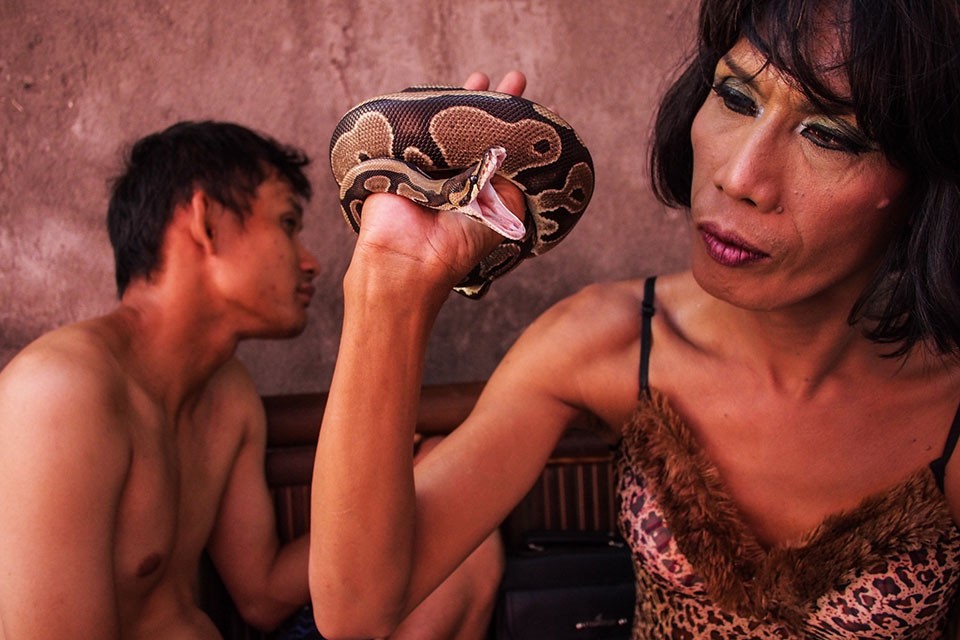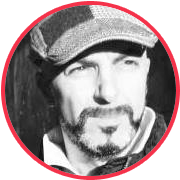
Fulvio Bugani: “My First Interest Is to Document a Situation, Without Judging”

I was 17 years old maybe when one of my pictures was used as a cover for a magazine. It was a great feeling. I clearly remember the subject of my photo – there were a few elder people harvesting grapes on the Appennino, the mountains near my city, Bologna.
I don’t think there is anything I have to be ashamed of – even though I had some negative experiences, they helped me to grow. I’ve never done anything which I consider unethical or against a personal “red line,” which you don’t want to cross.
Whenever I do a reportage strictly related with human rights or crucial social issues, I feel that my work is important and could in an indirect way change the situation by giving voice to the people who are suffering in that situation. Photography is a way to bring to the attention of ordinary people to some important topic. This can lead people to take action. That’s what happened to me when I was in Uganda with Medicine Sans Frontiere, documenting the poor living conditions of Congolese refugees in Bubukwanga Camp; or inside the slums of Nairobi.
{ “img”: “/wp-content/uploads/2015/06/Fulvio_Bugani-10.jpg”, “text”: “Panoramic view of the refugee camp of Bubukwanga.”}
{ “img”: “/wp-content/uploads/2015/06/Fulvio_Bugani-11.jpg”, “text”: “A rapist lynched by a crowd. “}
Every day, all over the world, ordinary people must flee their homes for fear of death or persecution. Many leave without notice, taking only what they can carry. Many will never return. They cross the border, looking for safety and humanitarian aid, putting their lives and their futures at risk. This is what is happening in the Democratic Republic of Congo (DRC) due to the fight between military and M23 rebels. In Congo’s North Kivu province, in July 2013, when hostilities between the two groups reignited, 40,000 – 50,000 people have crossed the border to take refuge in Uganda.
Close to the village of Bundibugyo, located around 7 kilometers within the Uganda border, the Bubukwanga refugee camp has been created. This space that was designed for only 12,500 people is hosting twice as many. Usually Bubukwanga is only a transit camp where refugees stay for just a few days before being transferred to a permanent camp. But as the security situation deteriorates in DRC, the number of new arrivals at the transit camp is increasing, up to 300-500 people a day. In this situation of emergency, that transfer operations as well as health care and the supply of food and basic tools, have been insufficient. There is a high concern for the awful hygiene, sanitation facilities and for drinking water supply.
{ “img”: “/wp-content/uploads/2015/06/Fulvio_Bugani-12.jpg”, “text”: “Despite the tragedy, life goes on. a woman has just delivered a baby on the floor.”}
{ “img”: “/wp-content/uploads/2015/06/Fulvio_Bugani-13.jpg”, “text”: “The few peaceful moments in the Bubukwanga camp are in the delivery room of the hospital.”}
Honestly, I never think about a project as something finished. There is always something more you can tell about a story. In my mind all my projects are always open for a next step.
I don’t think I want to change something in my life because what I got is what I wanted. I built my life by myself trying to pursue my goals. You don’t always get what you want but even from negative experiences you can learn something good.
For me, photography is a way of life. Everything I do is always related to photography. It’s not just a job or a passion. It is far more than that. Photography is a means of communication; it’s a way to express and convey important messages. But, in order to understand photography you need to be able to “read” an image. You need to learn how to approach it. It is a form of culture which needs to be cultivated. For me it is a way to be free.
To be a photojournalist you need to have a special attitude because you have to be right there where things happen (as Thomas Hoepker said), you have to live with the people and share with them your daily life. In a way you are like an actor, but what you live is real and not fake.
I work as a freelancer and I fund all my projects by myself. Seeing that my work is important for others, further than me, is a strong incentive to continue in this direction. It is not always easy. Sometimes it implies hard life decisions.
The photography gives me the opportunity to come into contact with many different people and that expands my vision and understanding of the world. Photography is definitely a way to know each other better. That is what I love about it.
{ “img”: “/wp-content/uploads/2015/06/Fulvio_Bugani-3.jpg”, “text”: “”}
In Indonesia, transexuals are known as waria, a term which is a combination of two Indonesian words: “wanita,” which means woman, and “pria,” which means man. The area of greater Yogyakarta, located on the island of Java, is home to approximately 3 million people and 300 waria, who usually live in isolated communities. Indonesia has the largest Muslim population in the world. Many waria are Muslim, which raises some confusing and convoluted questions about Islam’s official stance on gender-bending. Generally speaking Islamic law forbids men to dress and adopt the mannerisms of women, and vice versa, but according to the Koran, muslims are not allowed to classify people based on economic, social, political, gender or theological values.
Waria face a certain level of marginalization and discrimination, especially when they encounter pockets of Islamic radicalism. But surprisingly warias are also quite accepted in Yogyakarta.
For this reason Shinta Ratri a LGBT activist opened in her house a Pesantren Waria (Islamic boarding school for transgenders), the first and only one of its kind in Indonesia and possibly in the world. Although it is called a boarding school, the Pondok Pesantren Waria Al-Fatah functions more like a religious school where students can learn classical religious subjects like “fiqh and Qur’an” recitation, as well as a community centre where students can meet.
Shinta Ratri is a 53 years old transgender, very proud to be a woman and a muslim. As every transgender she pays a lot of attention to her physical appearance and everything that identifies her as a woman. This is why over the years she has undergone an unhealthy practice of injecting silicone straight under the skin.
{ “img”: “/wp-content/uploads/2015/06/Fulvio_Bugani-4.jpg”, “text”: “Shinta Ratri is praying during the annual LGBT and waria (Indonesian transgender) community meeting, where the relationship between sex and religion is discussed. Yogyakarta, August 2014.”}
{ “img”: “/wp-content/uploads/2015/06/Fulvio_Bugani-5.jpg”, “text”: “Shinta Ratri.”}
Many warias have no families and no legal identities. Their families don’t know who they really are. Some of them play waria at night and man during the day. Others can count on their own families and run a fairly normal life as women. Even though waria assume the identity of women, they usually retain their male reproductive organs, because operations are far too expensive. The few who can afford an operation have their breasts done, while all the others face a horrible and unhealthy practice where the silicone is forced straight under the skin. Since many are prostitutes they also face the risk of HIV and other sexually transmitted infections.
{ “img”: “/wp-content/uploads/2015/06/Fulvio_Bugani-6.jpg”, “text”: “Angel posing in her room.”}
{ “img”: “/wp-content/uploads/2015/06/Fulvio_Bugani-7.jpg”, “text”: “Shinta Ratri applies make-up at home in Kotagede.”}
{ “img”: “/wp-content/uploads/2015/06/Fulvio_Bugani-7a.jpg”, “text”: “Nur smoking a cigarette in her kitchen.”}
{ “img”: “/wp-content/uploads/2015/06/Fulvio_Bugani-8.jpg”, “text”: “Angel during the make-up in the morning.”}
{ “img”: “/wp-content/uploads/2015/06/Fulvio_Bugani-9.jpg”, “text”: “Kirana and her snake.”}
I’m an open-minded person. I don’t have any particular restrictions I can tell you about. As a photojournalist my first interest is to document a situation, without judging.
There can be different sources of inspirations. Most of the time are the people themselves. Aesthetically speaking my mentor is Alex Webb, who I consider a great photographer. I don’t want to copy him, but I always try to learn something from his photos, something which I can elaborate in my work.
I always try to mingle with the crowd as much as possible, in order to be less visible. I don’t want to be seen as a tourist so I dress accordingly. Nor I want to seem a big photographer otherwise people are scared. I prefer to feel part of the community where I am. It’s much easier to work then and you have easier access to more intimate situations.
All this can be very stressful because you need to be aware of who you are and where you are. My way to deal with stress while I’m working is easy. I usually try to find a place where I feel home, and someone who I can talk as a friend and when I feel over the edge I go in this place for a break or I visit that person for an informal detoxing chat.
{ “img”: “/wp-content/uploads/2015/06/Fulvio_Bugani-1.jpg”, “text”: “Indonesia- Lamalera, Lembata Island – Getting into the sea with small wooden boats is a dangerous operation due to ocean’s weaves crashing on the rocks which emerge from the water. The fishermen use these boats to hunt sharks, whales and dolphins.”}
Life is a never ending experience, you just have face it and see where it brings you.
With no doubt the thing I love most about my work is travelling. I love to discover new places, meet new people, share our life together and being able to be just right there at that right moment.
{ “img”: “/wp-content/uploads/2015/06/Fulvio_Bugani-2.jpg”, “text”: “Traditional feast of circumcision. “}
I love my life, and I fought for it exactly as it is. I don’t wait for things to happen but I try to go where I desire. I wanted to be a photographer, and I am. The World Press Photo Award which I received this year has been a dream come true, but also the evidence of the fact that I am working in the right direction.
The lights and the colors in Cuba are wonderful. I’m working on Cuba for my long term project since 2009.
{ “img”: “/wp-content/uploads/2015/06/Fulvio_Bugani-14.jpg”, “text”: “”}
{ “img”: “/wp-content/uploads/2015/06/Fulvio_Bugani-15.jpg”, “text”: “”}
{ “img”: “/wp-content/uploads/2015/06/Fulvio_Bugani-16.jpg”, “text”: “”}
New and best




